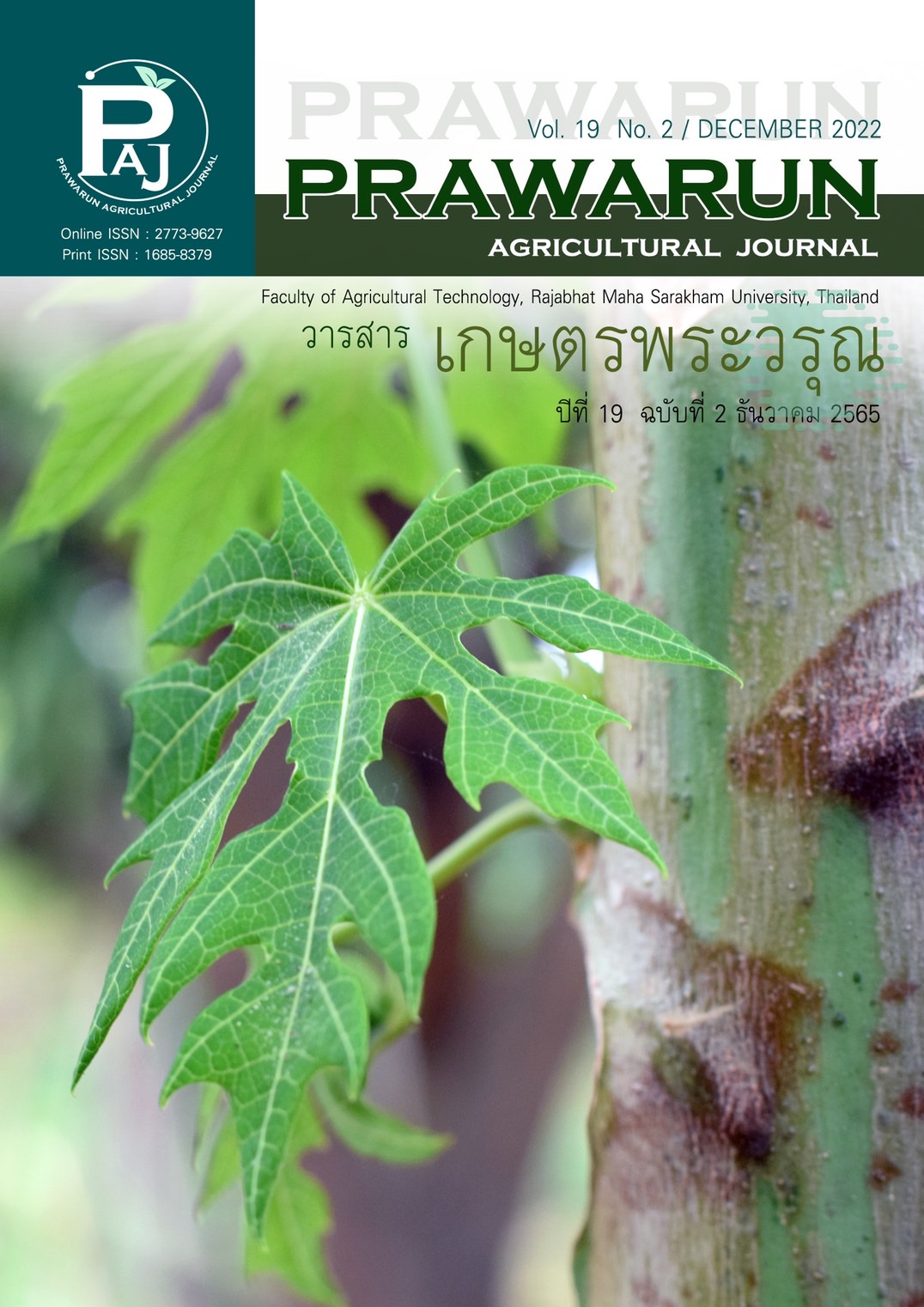ผลการเสริมน้ำส้มสายชูเทียม น้ำส้มควันไม้ และกรดอินทรีย์ในอาหารไก่ไข่ต่อสมรรถภาพการผลิตและคุณภาพไข่
Main Article Content
บทคัดย่อ
การศึกษาครั้งนี้มีวัตถุประสงค์เพื่อเปรียบเทียบผลการเสริมน้ำส้มสายชูเทียม น้ำส้มควันไม้ และกรดอินทรีย์รวมในอาหารไก่ไข่ต่อสมรรถภาพและคุณภาพไข่ ทำการทดลองในไก่ไข่สายพันธุ์ไฮไลน์-บราวน์ อายุ 46 สัปดาห์ จำนวน 40 ตัว โดยแบ่งออกเป็น 4 กลุ่ม ๆ ละ 5 ซ้ำ ๆ ละ 2 ตัว ไก่ไข่จะได้รับอาหารทดลองที่เสริมน้ำส้มสายชูเทียม น้ำส้มควันไม้ และกรดอินทรีย์รวมที่ระดับ 0.3 % ของอาหาร เปรียบเทียบกับกลุ่มควบคุมที่ไม่มีการเสริม ทดลองเป็นระยะเวลา 6 สัปดาห์ บันทึกผลผลิตไข่ น้ำหนักไข่มวลไข่ ปริมาณอาหารที่กิน อัตราการเปลี่ยนอาหารเป็นผลผลิตไข่ ต้นทุนค่าอาหารต่อการผลิตไข่ 1 กก. และตรวจสอบคุณภาพไข่ทุก 2 สัปดาห์ ผลการทดลองพบว่า การใช้สารเพิ่มความเป็นกรดในอาหารมีแนวโน้มทำให้น้ำหนักไข่ (p = 0.078) และมวลไข่ (p = 0.064) มากกว่ากลุ่มควบคุม ในด้านคุณภาพไข่ พบว่า การใช้สารเพิ่มความเป็นกรดมีผลทำให้ความความแข็งแรงของเปลือกไข่ (p < 0.05) และความหนาเปลือกไข่ (p = 0.083) ที่อายุ 47 สัปดาห์ มากกว่ากลุ่มควบคุม ผลจากการทดลองแสดงให้เห็นว่าการใช้สารเพิ่มความเป็นกรดในอาหารไก่ไข่ที่ระดับ 0.3 % มีแนวโน้มทำให้น้ำหนักไข่ ความหนาและความแข็งของเปลือกไข่เพิ่มขึ้น
Article Details
เอกสารอ้างอิง
Fouladi, P., Ebrahimnezhad, Y., Aghdam Shahryar, H., Maheri, N., & Ahmadzadeh, A. (2018). Effects of organic acids supplement on performance, egg traits, blood serum biochemical parameters and gut microflora in female Japanese quail (Coturnix japonica). Brazilian Journal of Poultry Science, 20(1), 133-144. doi: 10.1590/1806-9061-2016-0375.
Hedayati, M., Manafi, M., Yari, M., & Avara, A. (2014). The influence of an acidifier feed additive on biochemical parameters and immune response of broilers. Annual Research & Review in Biology, 4(10), 1637-1645. doi: 10.9734/ARRB/2014/8210.
Khan, S. H., & Iqbal, J. (2016). Recent advances in the role of organic acids in poultry nutrition. Journal of Applied Animal Research, 44, 359–369. doi: 10.1080/09712119.2015.1079527.
Pornchaloempong, P., & Rattanapanone, N. (2022). Vinegar. Accessed October 19, 2022. Retrieved from https://www.foodnetworksolution.com/wiki/word/1183/vinegar. (in Thai)
Rattanawut, J., Trairabeap, D., Karrila, S. J., Rodjan, P., & Theapparat, Y. (2019). Production performance, egg quality, and fecal bacterial population of laying ducks fed ration supplemented by bamboo vinegar. Tropical Animal Science Journal, 42(3), 224-229. doi: 10.5398/tasj.2019.42.3.224.
Roofchaei, A., Rezaeipour, V., Vatandour, S., & Zaefarian, F. (2019). Influence of dietary carbohydrases, individually or in combination with phytase or an acidifier, on performance, gut morphology and microbial population in broiler chickens fed a wheat-based diet. Animal Nutrition, 5(1), 63–67. doi: 10.1016/j.aninu.2017.12.001.
Samanta, S., Haldar, S., & Ghosh, T. K. (2010). Comparative efficacy of an organic acid blend and bacitracin methylene disalicylate as growth promoters in broiler chickens: Effects on performance, gut histology and small intestinal milieu. Veterinary Medicine International, 2010, 645150. doi: 10.4061/2010/645150.
Swiatkiewicz, S., Koreleski, J., & Arczewska, A. (2010). Laying performance and eggshell quality in laying hens fed diets supplemented with prebiotics and organic acids. Czech Journal of Animal Science, 55(7), 294-306. doi: 10.17221/207/2009-CJAS.
Velmurugan, N., Chun, S. S., Han, S. S., & Lee, Y. S. (2009). Characterization of chikusaku-eki and mokusaku-eki and its inhibitory effect on sapstaining fungal growth in laboratory scale. International Journal of Environmental Science and Technology, 6(1), 13-22. doi: 10.1007/BF03326056.
Vinus, N. S., & Tewatia, B. S. (2017). Organic acids as alternatives to antibiotic growth promoters in poultry. The Pharma Innovation Journal, 6(11), 164-169.
Watarai, S., & Tana, T. (2005). Eliminating the carriage of Salmonella enterica serovar Enteritidis in domestic fowls by feeding activated charcoal from bark containing wood vinegar liquid (Nekka-rich). Poultry Science, 84(4), 515-521. doi: 10.1093/ps/84.4.515.


